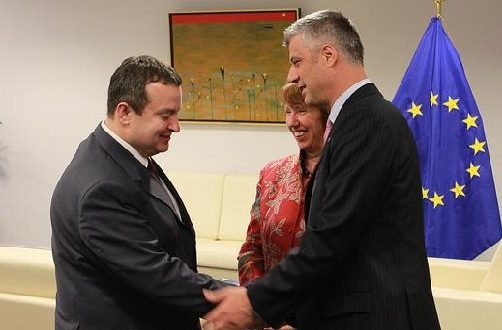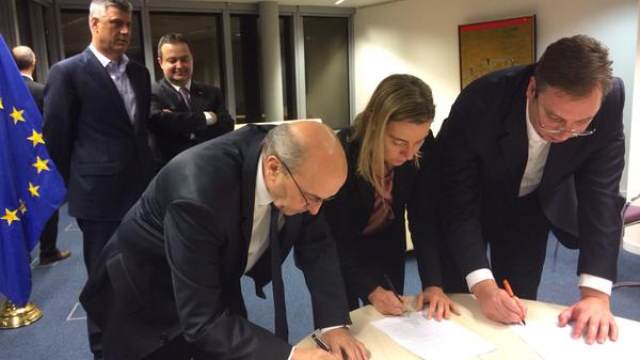Association/ Community of Serb – Majority Municipalities
Kosovo and Serbia reached the Brussels Agreement (originally named, First Agreement of Principles Governing the Normalisation of Relations) on 19 April 2013. A part of this agreement is dedicated to the formation of an Association/Community of Serb-majority municipalities in Kosovo or simply known as ASM/CSM.
Based on the agreement, the association/community will be a structure of Serb-majority municipalities in Kosovo: North Mitrovicë/a, Zubin Potok, Zvečan/Zveçan, Leposavić/Leposaviq, Gračanica/Graçanica, Štrpce/Shtërpca, Novo Brdo/Novobërda, Klokot/ Kllokot, Ranilug/ Ranillug and Parteš/Partesh, which strives to integrate Kosovo Serbs throughout the territory.
 This association is specially intended to attract the transition of Kosovo Serbs (in northern municipalities), from Serbia’s system into that of Kosovo, and to facilitate the full integration of the remaining Serb parallel institutions in the north, including health and education structures.
This association is specially intended to attract the transition of Kosovo Serbs (in northern municipalities), from Serbia’s system into that of Kosovo, and to facilitate the full integration of the remaining Serb parallel institutions in the north, including health and education structures.
The association is based in the European Charter of Local Self-Government and the Ahtisaari Plan.
In line with the agreement, ASM/CSM competences would be exercised collectively and include a full overview of the areas of economic development, education, health and social care, urban and rural planning.
As for its organizational structure, ASM/CSM would be composed of the same bodies, as already existing Associations of Kosovo Municipalities:
- An Assembly
- A President
- A Council
- A Board
- An administration
- A complaints office.
A Management Team, composed of four Kosovo Serbs from the north was tasked with drafting the Statute of ASM/CSM.
The Association/Community would be open for membership to other municipalities and the dissolution would only take place by the decision of the participating municipalities.
On 25 August 2015, Kosovo and Serbia agreed on the General Principles/ Main Elements of ASM/CSM. The agreement sets the legal framework, objectives, organizational structure, relations with the central authorities, legal capacities and general and final provisions of the Association/Community.
Accordingly, once established, ASM/CSM will be able to:
– propose amends to the legislation and other relevant regulations;
– initiate or participate in the proceedings before competent courts, including the Constitutional Court, against any act or decision from any institution that affects ASM/ CSM’s exercise of powers;
– nominate representatives in the competent organs of the central government and to access information from central authorities, in accordance with Kosovo law;
– own movable and immovable property, to co-own companies that provide local services within the scope of association and to conclude contracts;
– have its own budget based on the funds as a result of the contribution of members, incomes generated from the services provided, transfer from central authorities or contributions, grants and donations from associations and organizations- international or domestic, as well as Serbia;
– to have its own symbols and coat of arms, in accordance with Kosovo law; and
– to have its own statute.
This agreement was criticized by the opposition and the general public in Kosovo. It fueled an unprecedented crisis in the country, including mass protests. The opposition also initiated a petition with 200,000 signatures, which was presented to the Parliament.
Forced by increased tensions, on 31 October 2015 the President of Kosovo requested from the Constitutional Court of Kosovo to assess the compatibility of the “general principles/main elements of ASM/CSM” with the spirit of the Constitution.
The Court found that the principles are not entirely in compliance with the Constitution, respectively that:
- Objectives, structural organization, budget, support and general provisions of the Association, go beyond the Kosovo constitutional standards of local self-governance;
- The right of legislative initiative is exclusively provided to the President of the Republic of Kosovo, the Government, the deputies of the Assembly or to at least ten thousand citizens;
- Association/Community cannot be vested with full and exclusive authority to promote the interests of the Kosovo Serb community in its relations with the central authorities.
After the verdict, the implementation of the agreement became impossible.
Both Kosovo and Serbia refuse to compromise any further. Pristina insists to implement the agreement in accordance with Court’s decision, with no executive powers vested to ASM/CSM. And Belgrade only accepts the establishment of ASM/CSM in line with the general principles/main elements and with competencies as agreed in 2015.
To this day, Management Team, which was tasked with drafting the Statute, has not presented its work to European Union representatives, nor to Kosovo or Serbia.
Parties continue to disagree on fundamental aspects of the ASM/CSM, including its name; Serbia from the very beginning refers to it as a Community and Kosovo as an Association. This language is even reflected in the agreement itself.


While these differences remain, ASM/CSM continues to be a thorny issue, a source of contradictions and hostility, spoiling the dialogue process between Kosovo and Serbia.



